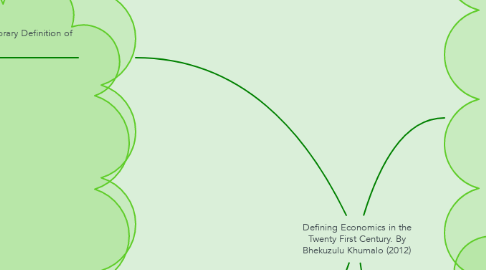Defining Economics in the Twenty First Century. By Bhekuzulu Khumalo (2012)
by franklyn guarin

1. 1. Contemporary Definition of Economics:
1.1. Samuelson distils his definition of economics to a “…common theme. Economics is the study of how societies use scarce resources to produce valuable commodities and distribute them among people.”
1.2. Alfred Marshall at the end of the 19th century, defined economics as, “the study of people in the ordinary business of life.” His definition was opening the door to the modern definition of economics.
1.3. Ronald M. Ayers and Robert A. Collinge define economics as, giving two interpretations, the first, “Economics examines how to make choices well.” They also say, “Economics studies the allocation of limited resources in response to unlimited wants.”
2. 3. Towards a Twenty First Definition of Economic:
2.1. It is human beings who identify a resource, they identify this resource through knowledge. What is not a resource today can very well be a valuable resource in the future because of the growing knowledge base. Therefore not all materials are resources, but all materials are potential resources that can be commodified, that is can be made into a commodity and commercialized because they have a use for mankind
2.2. Not all humans can be considered a resource, but all humans are a potential resource for a society. People are resources because of their abilities, and all ability over and above physical power comes from knowledge. Physical strength without knowledge of what to do is meaningless
2.3. It is accurate to say knowledge is needed to combine resources to create useful products and services, but it is not enough. It is also knowledge itself that is used to identify and create resources, therefore, knowledge itself is the primary resource and catalyst in every process of the economic process.
2.4. Goods are the result of use knowledge, that is to say knowledge that has been transformed to meet the needs of humanity. Exchanging knowledge can not be a bad thing, international trade therefore should be encouraged, this way the knowledge base of humanity increases, as each society seeks knowledge and shares its knowledge in the market place.
3. 2. What Was Seen but Not Acted upon:
3.1. By the twentieth century the most original economists understood the power of knowledge and others where no longer afraid to take risks in discussing knowledge. Dale Neef thinks that “‘the knowledge-based economy’ describes the ever-increasing proportion of the nations GNP dedicated to computerization and high-technology electronics industries.”
3.2. ”, Hayek said: “This interaction of individuals, possessing different knowledge and different views, is what constitutes the life of thought. The growth of reason is a social process based on the existence of such differences...”
3.3. Hayek clearly understood the process of the knowledge process in society and why freedoms must be guaranteed. Hayek of course was mainly concerned with the encroachment of big government and used knowledge as a defense for greater freedoms on that score he was right, he understood the laws of knowledge though not laying them down in point form.
4. 4. Application of Definition to Economic Thought:
4.1. Knowledge is respecting that everything takes time, especially economic development, as knowledge is built upon knowledge. Having knowledge as such does not itself guarantee great economic success, it is allowing people to use their knowledge
4.2. Take resource rich countries, for a most part all they do as extract resources and sell them. In most instances this countries are static in cases of scientific inquiry, understanding and appreciating knowledge could very well change their attitudes, that they can be more than just resource providers, they can participate at a deeper level in the global economy.


